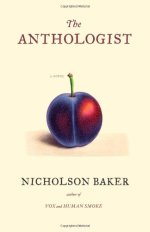Reposting my review here, so that it doesn't get lost in the eternally evolving "Recently Finished Books" thread,

?? Nicholson Baker,
The Anthologist,
3.5
A wonderful novel about an Oblomov-like literary scholar and would-be poet who is more than happy to drown in credit card debt, watching life slip him by.
I loved the narrator's humorous reflections about poets and poetry, but in the end it all seemed a little too slim. I don't care if the main character is not likable, but he/she/they MUST have at least
some depth. And depth is what was lacking in Paul Chowder, the protagonist of this book.
I don't necessarily think of it as a shortcoming though--I think one of Baker's "points" is to demonstrate how precisely devoid of depth his anthologist really is.
Paul is unable to write even the shortest of introductions (for a poetry anthology); his girlfriend leaves him; he doesn't seem to be able to clean out his office; and he can't even finish the simplest of poems (rhymed, unrhymed, doesn't matter).
He discovers, however, that he excels at the mundane stuff: mowing the lawn, helping his neighbor install a new floor, painting houses for money, etc. In the end, it is the very mundanity of life that saves him from overthinking it.
The ending felt a little rushed: for sixteen whole chapters Paul is not able to do anything (as a writer), then suddenly, at the end (the last chapter is a mere page and a half) he finishes his introduction (it turns out to be 200 pp. long!) and writes over two dozen original poems. His girlfriend tells him that she likes living by herself but also that she still loves him, and does he want to come over for dinner this Saturday (*hint, hint*). He even gets hired by a friend as a painter (of walls, not pictures), which provides him with stability, routine, and a much-needed paycheck at the end of each week.
I finished the book in two days (took a break from Mukasonga), and thoroughly enjoyed its humorous tone. I think there are certain points in all of our lives when we feel like Paul--unable to finish what we've started, even though we have been chipping away at it for quite some time.
I also enjoyed Baker's chiseled sentences, he imbues life (even the seemingly "boring," sedentary life of a scholar) with poetry and beauty.
Toward the end of the book, on a particularly misty morning, Paul manages to catch a mouse inside a pitcher in his kitchen. He then tells us: "I took him out to the lilac bush and let him go in the mist." I don't know why, but I find that sentence to be very beautiful.
A little earlier, he catches a horntail wasp (crawling on his windowsill) inside a glass: "It buzzed, but it was tired from its struggle with with the window dust. I walked with it down to the old lilac tree and let it go there. It could probably insert its ovipositor into one of the dead lilac branches. Roz [his girlfriend] once showed me something about old lilac wood: it has a streak of purple deep inside, as if it soaks some of the purpleness of the blossoms back into itself when they go."
The novel is filled with many such beautiful asides and observations. I think it can be thoroughly enjoyed by the general reader, but especially by the kind of reader who is also passionate about poetry.
Finally, my favorite sentence: "You need
art in order to love
life."

